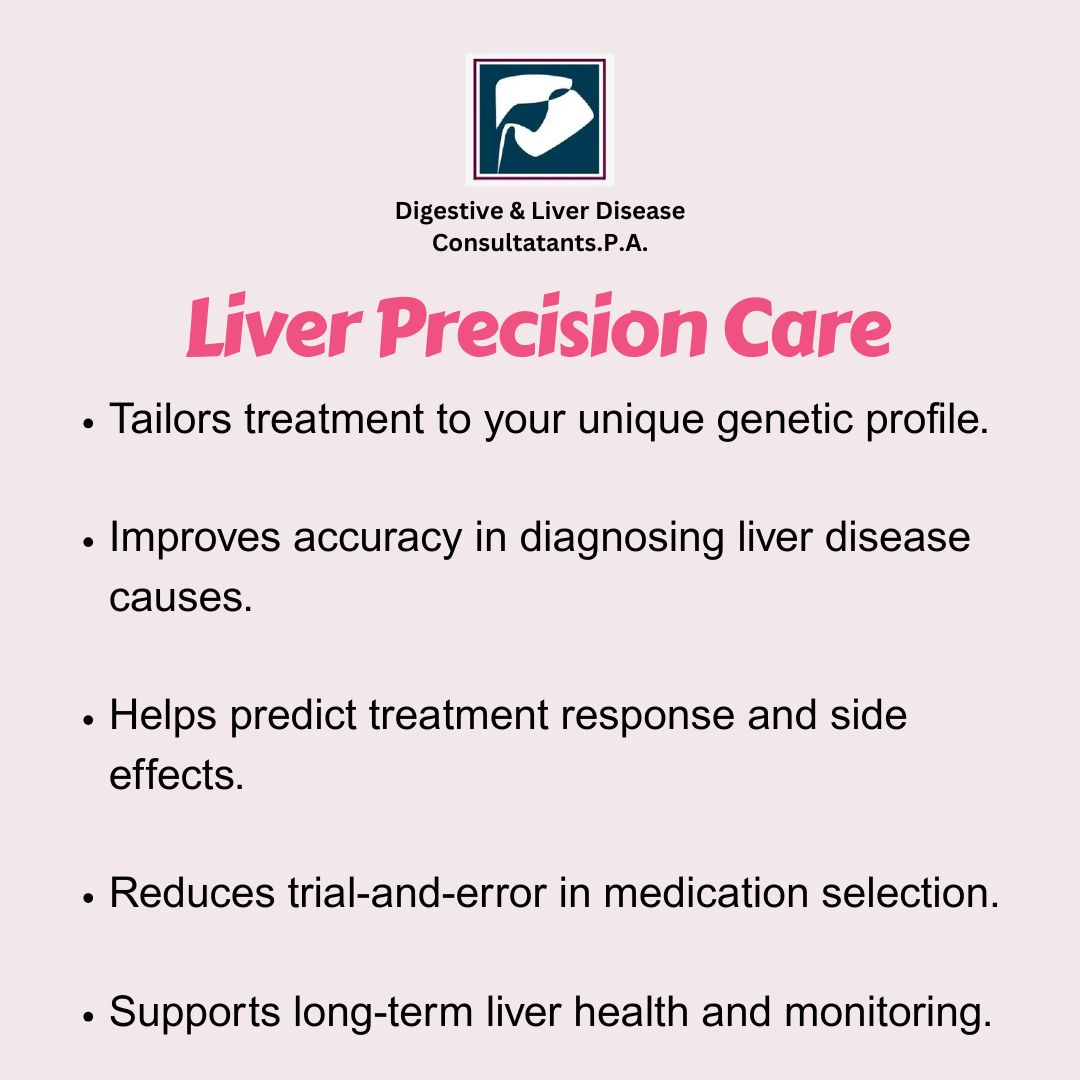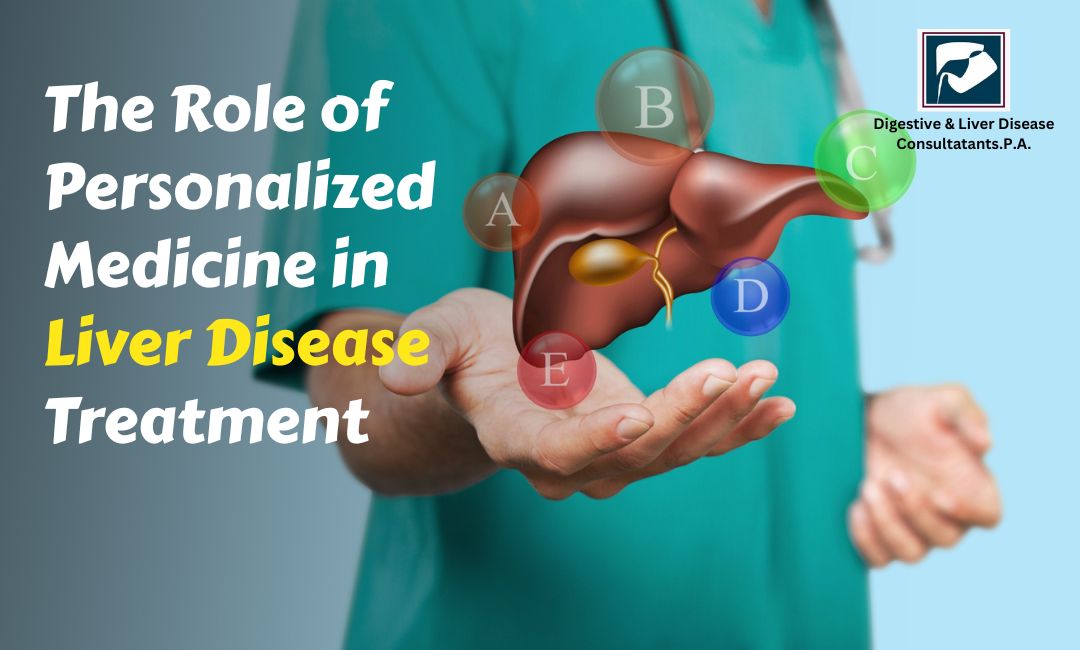Liver disease affects millions of people worldwide, and its treatment can often be complex. Every patient’s liver condition is unique, influenced by various factors such as genetics, lifestyle, environment, and overall health. This is where personalized medicine comes into play. Personalized medicine tailors treatment to the individual, offering a more targeted and effective approach to managing liver diseases. At Digestive & Liver Disease Consultants, P.A., we are proud to incorporate personalized medicine into our care, ensuring our patients receive the best possible treatment for their specific conditions.
What is Personalized Medicine?
Personalized medicine, sometimes called precision medicine, is a medical approach that uses information about a person’s genetic makeup, lifestyle, and environment to guide decisions about prevention, diagnosis, and treatment. Unlike the traditional “one-size-fits-all” method, personalized medicine focuses on understanding the individual differences in each patient’s disease and response to treatment.
In the context of liver disease, this approach means analyzing the patient’s genetic profile, liver function, and other health factors to develop a customized treatment plan that can improve outcomes and reduce side effects.

Why is Personalized Medicine Important in Liver Disease?
Liver diseases can range from fatty liver disease and hepatitis to cirrhosis and liver cancer. Each type of liver disease behaves differently and responds differently to treatment. Factors such as:
The cause of the disease (alcohol, viral infection, metabolic disorders),
- The stage of liver damage,
- The patient’s overall health, and
- Genetic variations
All influence how the disease progresses and how it should be treated.
Traditional treatments may work well for some patients but be less effective or cause complications for others. Personalized medicine helps to identify which treatments will work best for each individual, minimizing risks and maximizing benefits.
Genetic Testing and Liver Disease
One of the key tools in personalized medicine is genetic testing. By analyzing a patient’s DNA, doctors can learn about specific genetic mutations or predispositions that affect liver health.
For example:
- Certain genetic variations may increase the risk of developing non-alcoholic fatty liver disease (NAFLD).
- Genetic testing can help identify hereditary conditions such as hemochromatosis (iron overload) or Wilson’s disease (copper accumulation), which require specific treatment approaches.
- Some genetic markers can predict how a patient will respond to antiviral drugs used for hepatitis infections.
With this information, healthcare providers can choose the most effective medications and dosages tailored to the patient’s genetic profile.
Personalized Treatment Plans
Personalized medicine involves creating a treatment plan that is as unique as the patient. This might include:
Targeted medications: Choosing drugs that specifically address the patient’s liver disease type and genetic makeup.
Lifestyle recommendations: Customizing diet, exercise, and alcohol consumption guidelines based on the patient’s condition and risks.
Monitoring and adjustments: Regularly tracking liver function and treatment response to adjust therapies as needed.
Preventive strategies: Identifying patients at higher risk of disease progression and taking early steps to prevent complications.
This tailored approach helps reduce unnecessary treatments and side effects, improving the quality of life for patients.
The Role of Advanced Diagnostics
Personalized medicine relies on advanced diagnostic tools to gather detailed information about the liver and overall health. These may include:
- Imaging studies like ultrasound, CT scans, or MRI to assess liver structure.
- Blood tests that evaluate liver enzymes, function, and viral infections.
- Non-invasive fibrosis tests to determine the extent of liver scarring.
- Genetic and molecular testing for a deeper understanding of liver disease causes.
At Digestive & Liver Disease Consultants, P.A., we use the latest technology to provide precise diagnoses, which form the foundation for personalized treatment.
How Personalized Medicine Improves Outcomes
Studies have shown that personalized medicine can lead to better health outcomes for liver disease patients by:
- Reducing treatment failures,
- Minimizing adverse drug reactions,
- Slowing disease progression,
- Increasing patient adherence to treatment plans, and
- Enhancing overall patient satisfaction and quality of life.
By tailoring treatments specifically to each patient, healthcare providers can focus on what works best rather than relying on trial-and-error approaches.
Personalised Medicine at Digestive & Liver Disease Consultants, P.A.
At Digestive & Liver Disease Consultants, P.A., we are committed to providing patient-centered care using the principles of personalized medicine. Our team of experienced gastroenterologists and hepatologists work closely with patients to understand their unique health needs and develop customized treatment plans.
We offer:
- Comprehensive evaluation and diagnostics,
- Genetic testing when appropriate,
- Advanced treatment options including the latest medications and therapies,
- Lifestyle and nutrition counseling tailored to individual needs, and
- Ongoing monitoring and support throughout the treatment journey.
Our goal is to empower patients with knowledge and personalized care to manage their liver health effectively and improve their long-term outcomes.
Conclusion
Liver disease is a complex and varied group of conditions that require a thoughtful and individualized approach to treatment. Personalized medicine is transforming how we manage liver diseases by focusing on each patient’s unique genetic and health profile. This approach leads to more effective treatments, fewer side effects, and better overall outcomes.
If you are experiencing symptoms of liver disease or want to learn more about personalized treatment options, contact Digestive & Liver Disease Consultants, P.A. today.






